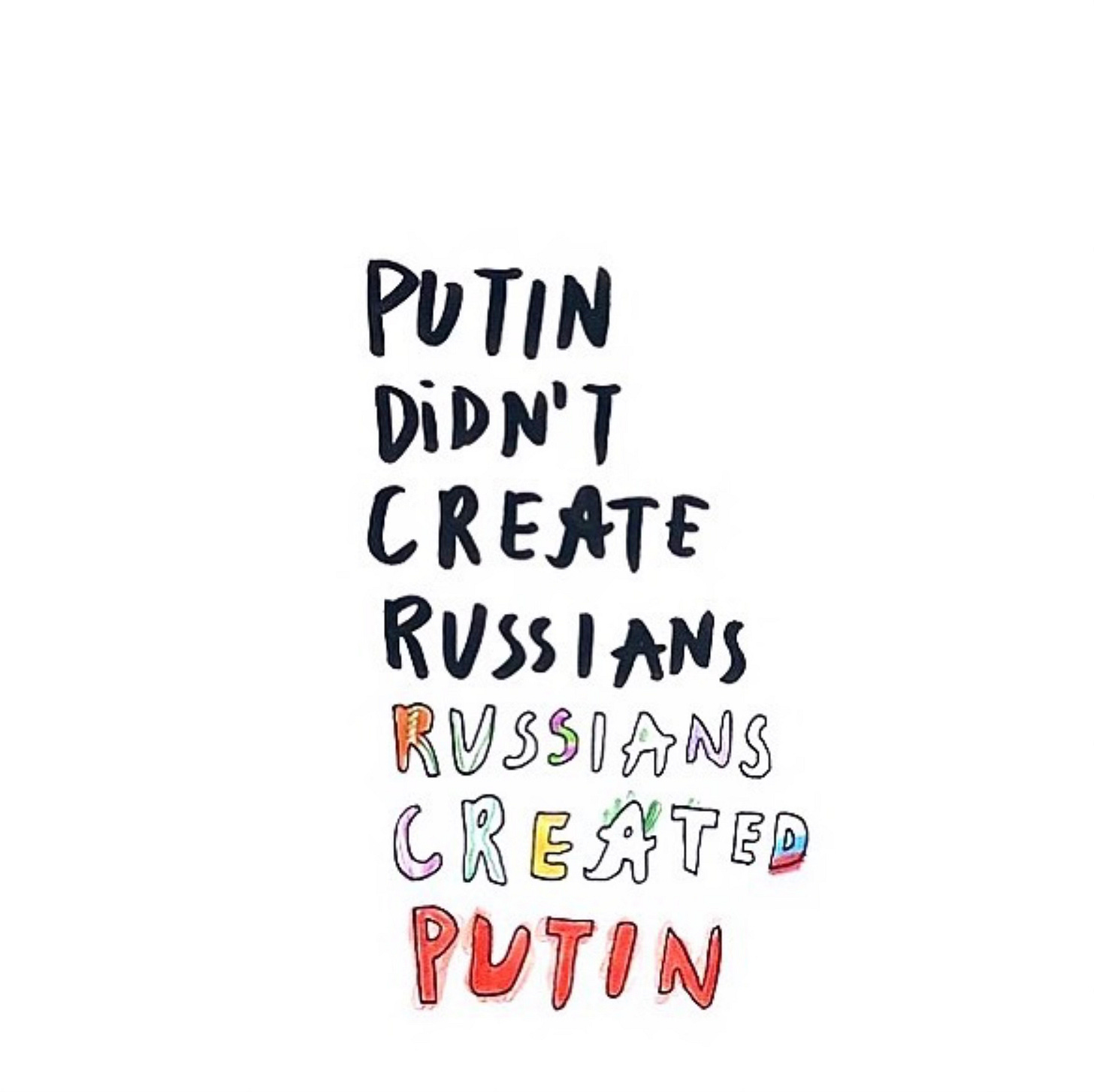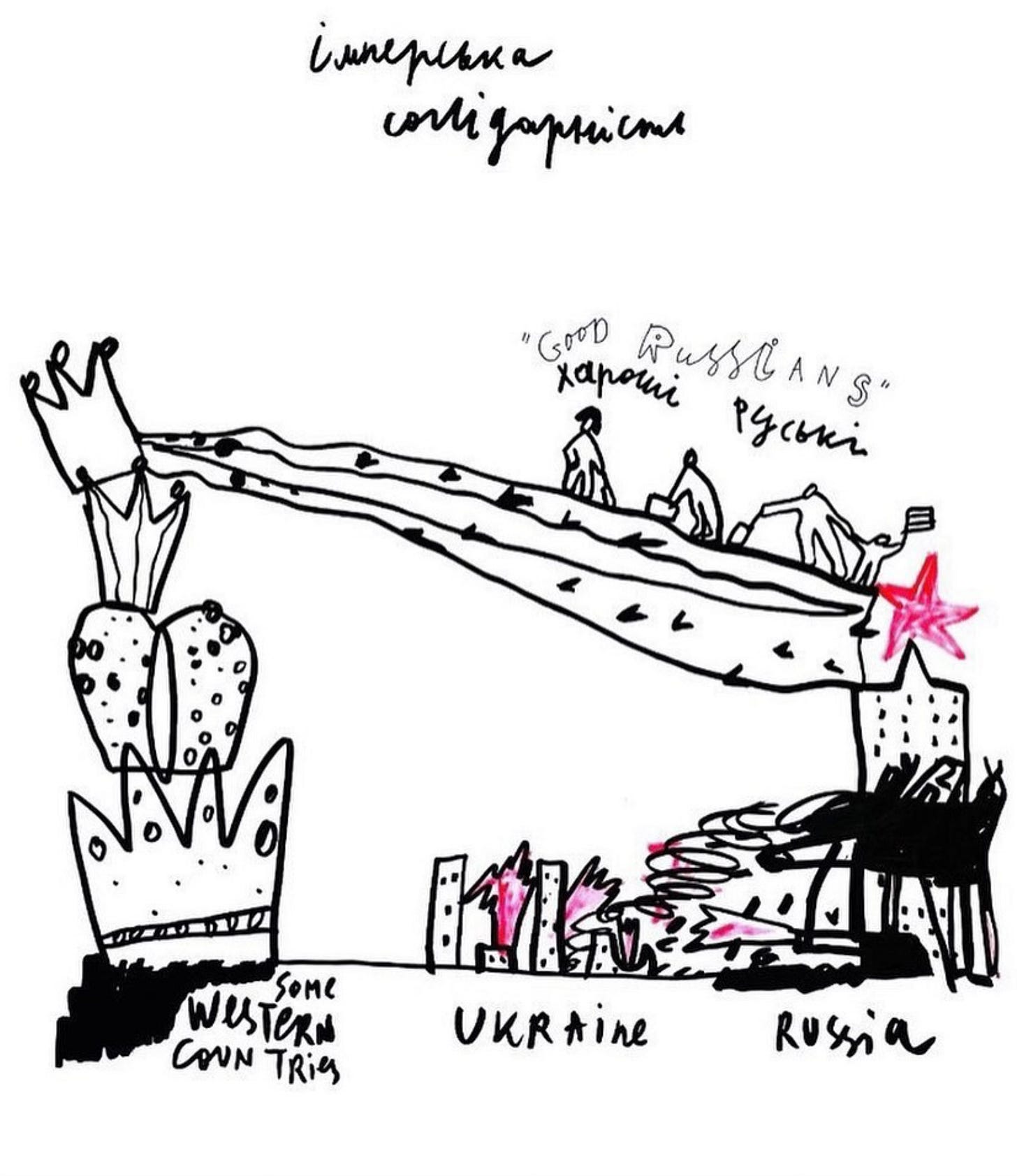Russian Colonialism 101 is the first newsletter to enlighten you about Russian colonialism. The opening essay is public; the weekly reading lists are behind the paywall. Your paid subscription will power my mission to mainstream awareness about Russian colonialism.
I started reading when I was five. My grandmother taught me. Every day, she would finish a long shift as a nurse in the hospital and then still find time to read with me a chapter from any book I’d pick from her personal library. Once I was good enough to read independently, she founded a tradition: gifting a book from her library, signed by her, for each of my birthdays. She likes to joke that this way, she put in motion a plan to fully transfer all her books from her library to mine by the time she passes away. She is 93, and her library is still quite full, so I expect her to keep the word and not leave me before the transfer is complete.
But here’s a catch: most of her books are in Russian.
Some of them are by openly xenophobic Ukrainophobes or full of anti-Ukrainian lies. It is not that my grandmother shares the same worldview. Back in her days, it would not be impossible to build up your home library with just Ukrainian books - they were rare, the empire made them hard to come by, and most were too dangerous to own, anyway.
You have an extensive home library and no books written by representatives of ‘Great Russian Culture?!’ You must be a hateful Ukrainian Nazi or simply mad! How dare you to reject the spoils of such a more advanced civilization and culture? Back in the day, that kind of shit could easily lead to you being ostracized or imprisoned. And it is still the reality for Russian-occupied Ukrainian communities.
Even if my grandma did partially share those ‘Russian supremacy’ views, then what?
Living under regular Russian bombardment for almost two years made her fundamentally change the way she looks at the past and the present. The hypnotic gaze of the empire crumbled for good. The first book she gifted me after the full-scale invasion started in 2022 was ‘Kobzar’ by Ukrainian anti-colonial troubadour Taras Shevchenko. She said she had no idea it was the most prized jewel in her book collection. Until the genocide started. And if she does not survive the year ahead (she did), she wants this book to be her last gift to me.
But what do I do with all these Russian-language books standing on my bookshelves, lovingly signed by my grandmother? A manifestation of our sacred family tradition, cemented by love and my eternal gratitude to the person who ensured I make enough impact in this life despite all the odds stacked against me.
Do I tuck them away?
Do I box them?
Do I throw them out?
Should I feel nothing but disgust that I even own Russian-language books while Russia burns en-masse Ukrainian books and uses the protection of the Russian language as an excuse to genocide my people?

One of those books, gifted by my grandmother, is by Kyiv-born Russian writer Mikhail Bulgakov. Lots of my first reading happened on those pages. Bulgakov also authored one of the most heinous and xenophobic storytelling targetting Ukrainians.
Coming from a family of Russian settler colonists brought to Ukraine to spread Russian ‘civilization supremacy,’ Bulgakov was deeply threatened and scared to witness the Ukrainian political and cultural renaissance of the early 20th century. It first propelled Ukraine out of the enslavement by the Russian colonial empire towards the first independent republic of 1917. Even after the latter fell to the Russian invasion, Moscow had to accommodate and recruit the Ukrainian intellectual elites. To help Russia make the next, red era of the empire ideologically and culturally appealing. That wasn’t the first or the last time Russia would do so. For example, Russians stole from Ukrainians the Kyivan Rus legacy to excuse the messianic ambitions of the newly-founded Russian empire in the 17th century. And then would regularly appropriate the most brilliant Ukrainian names, from Hryhorii Skovoroda to Kazymyr Malevych, to fill its void of civilizational stickiness and lastingness.
For the Bulgakovs of the 1920s, it meant Ukrainian indigenous talent and cultural vibrancy taking the central stage.
They hated it.
They lashed out.
"These grievances were connected with the trauma of the entire imperial culture. In particular, Russia, unlike the Western colonial powers, annexed some civilizationally more advanced territories than the metropole. Kyiv had an incomparably older historical tradition than Moscow. Russians had to invite Ukrainian scientists from the Mohyla Academy to set up the first Russian universities; they stole ancient relics from Ukraine to fill out Moscow and St. Petersburg museums to confirm the succession of power. Russians invented sophisticated theories about how closely connected Kyivan Rus and Muscovite Rus are. And now, to the great surprise and horror of the creators of great myths, everything began to fall apart." This is how Dr. Vira Ageyeva, a prominent Ukrainian literary critic and trailblazing feminist author, explains Bulgakov in her brilliant must-read ‘Behind the Scenes of the Empire’ (rumored to be available in English sometime soon, too.)
In his works, Bulgakov always described Ukrainians as uneducated, silly, and comical at best. Or animal-like, hateful, and hungry for violence at worst. No one else could master the art of Ukrainophobic portrayal better than him. That’s why Bulgakov remains one of the most prized writers of the Russian canon. One of the literary backbones of the imperial myth of Russian cultural supremacy.
The same imperial mouthpiece Bulgakov, whose works my grandmother utilized to teach me how to read — so I could eventually talk back at the Empire on my own.
After spending lots of time thinking about it, I decided to display all my grandmother’s books front and center in my home library.
Even the Russian-language ones.
Even the Bulgakov’s.
I want to pass by them daily and be reminded of what the decolonization journey really means. The entangled mess of conflicting, confusing, and complex aspects. Convoluted by pain, but also sometimes by love and the warm embrace of a family.
There are no clear cuts and easy ways out of the trauma of surviving colonization. But I’d rather start the journey with love and owning who we were, rather than being ashamed of it.
I need to see those grandma’s books daily. So, I always remember the arc of my decolonization journey. So, I never take it for granted. So I don’t forget that it can take many twists and turns and might never have an endpoint.
But as long as I am carrying forward, I am at peace.

here is what's in store for you this week:
Russia once controlled 20% of U.S. territory. That legacy helps explain its aggression against Ukraine.
Genocide is Russian culture. The romanticizing of it must stop.
The best shortcut to learning how Russian settler colonialism works is through learning more about the resistance of Crimean Indigenous people to physical and cultural erasure.
The long-standing tradition of the Ukrainian radical left to expose Russian colonialism.
Russia’s disastrous decision to invade Poland in 1920 has parallels with Putin’s rhetoric over Ukraine.
curious for more? let's go.



